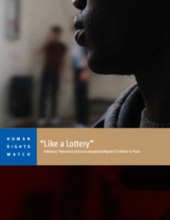This report from Human Rights Watch examines the arbitrary procedures and inordinate delays in determining that unaccompanied migrant children in France are under age 18, the first step to entry into the French child protection system. The report outlines the ways in which unaccompanied minors are mistreated, and their cases mishandled, in the processing of their cases and offers recommendations for addressing these issues.
The French Red Cross does age assessments for unaccompanied children in Paris, delegated to do so by the department of Paris (a department is a local administrative division of France), and it has established an evaluation facility (Dispositif d’evaluation des mineurs isolés étrangers, DEMIE) for this purpose. But many children who seek legal recognition of their age report that they are turned away at the door by security guards. Others go through a short interview of approximately five minutes followed by a summary verbal denial. This treatment falls short of what is required by French law, violates international standards, and means that those who are turned away must fend for themselves or seek assistance from nongovernmental organizations to find shelter, food, and other basic necessities.
Those who are fortunate enough to receive full interviews receive a formal decision from the Paris child welfare agency, the Directorate for Social Action, Children, and Health (Direction de l’action sociale, de l’enfance et de la santé, DASES), based on the DEMIE’s evaluation. They are often rejected if they do not have identity documents, even though international standards and French regulations note that documents—which may be lost during arduous journeys—are not required and that approximate age can be determined through questioning. But those who do have documents are also frequently rejected—child welfare authorities and French courts regularly question the validity of birth certificates, passports, and other identity documents, sometimes even when they have been authenticated by embassies.
Case files also reveal other arbitrary grounds on which child welfare authorities have decided that an individual is an adult and thus disqualified from the child protection system. In cases examined by Human Rights Watch, these include:
- Giving accounts that are too detailed—which examiners assess to be a sign of maturity.
- Giving accounts deemed imprecise, particularly if examiners find minor errors in dates.
- Travelling unaccompanied, even though many thousands of children travel on their own each year to France and other countries.
- Working, whether in home countries or at some point on the journey to France, even though work by teenagers is common and, for those travelling alone, often essential for their survival.
To address the serious concerns identified in this report, France should ensure that age assessments are used only when authorities have serious doubts about an individual’s claim to be under the age of 18. In such cases, they can take appropriate steps to determine age and establish eligibility for services, bearing in mind that all age assessments will be estimates. Age assessments should seek to establish approximate age through interviews and review of documents, as recommended by international standards. Assessments should be undertaken with sensitivity by trained examiners. These procedures should afford the benefit of the doubt so that if there is a possibility that an individual is a child, that individual is treated as a child.
Human Rights Watch concludes that, in line with opinion of several French medical authorities who have repeatedly found that medical examinations are not reliable means of determining age, particularly for older adolescents, they should not be used for this purpose. Instead, France should end the use of bone tests and similar medical examinations as means to determine age.

